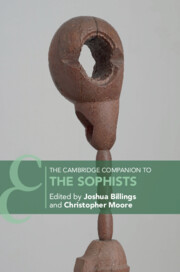Book contents
- The Cambridge Companion to the Sophists
- Other Volumes in the Series of Cambridge Companions
- The Cambridge Companion to the Sophists
- Copyright page
- Contents
- Contributors
- Note on the Text
- Introduction
- Part I Contexts
- Part II Thought
- 5 Nature and Norms
- 6 The Turn to Language
- 7 Problems of Being
- 8 Politics in Theory and Practice
- 9 Interrogating the Gods
- 10 Skills of Argument
- 11 Civic and Anti-Civic Ethics
- Part III Receptions
- Appendix: The People of the Sophistic Period
- Select Bibliography
- Index
- OTHER VOLUMES IN THE SERIES OF CAMBRIDGE COMPANIONS (continued from page ii)
9 - Interrogating the Gods
from Part II - Thought
Published online by Cambridge University Press: 23 December 2023
- The Cambridge Companion to the Sophists
- Other Volumes in the Series of Cambridge Companions
- The Cambridge Companion to the Sophists
- Copyright page
- Contents
- Contributors
- Note on the Text
- Introduction
- Part I Contexts
- Part II Thought
- 5 Nature and Norms
- 6 The Turn to Language
- 7 Problems of Being
- 8 Politics in Theory and Practice
- 9 Interrogating the Gods
- 10 Skills of Argument
- 11 Civic and Anti-Civic Ethics
- Part III Receptions
- Appendix: The People of the Sophistic Period
- Select Bibliography
- Index
- OTHER VOLUMES IN THE SERIES OF CAMBRIDGE COMPANIONS (continued from page ii)
Summary
In the late fifth century BCE, traditional religious beliefs and practices were being reconsidered from a variety of intellectual fields and viewpoints, but perhaps most vigorously interrogated by the Sophists. Although ancient Greek religion was characteristically open to change and local variety, the Sophists and contemporaneous thinkers put this flexibility to the test, as ancient reports of trials against intellectuals on account of their religious views attest. Anaxagoras and Socrates, in different ways, offer novel perspectives on what the divine is and is not; Protagoras in one way and the Derveni author in another question traditional certainties about our access to and knowledge of the divine; Prodicus, Democritus, and the so-called Sisyphus fragment provide psychological and/or sociological explanations of religious beliefs; and characters in plays by Euripides and Aristophanes deny outright the existence of the gods and, with that, the existence of traditional moral values.
- Type
- Chapter
- Information
- The Cambridge Companion to the Sophists , pp. 251 - 276Publisher: Cambridge University PressPrint publication year: 2023

